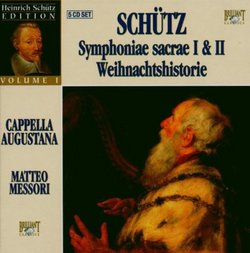| All Artists: Capella Augustana, Messori Title: Schutz: Symphoniae Sacrae I & II / Weihnachtshistorie Members Wishing: 0 Total Copies: 0 Label: Brilliant Classics Release Date: 4/4/2006 Album Type: Box set Genre: Classical Style: Symphonies Number of Discs: 5 SwapaCD Credits: 5 UPCs: 5028421921969, 842977021967 |
Search - Capella Augustana, Messori :: Schutz: Symphoniae Sacrae I & II / Weihnachtshistorie
 | Capella Augustana, Messori Schutz: Symphoniae Sacrae I & II / Weihnachtshistorie Genre: Classical |
Larger Image |
CD Details |
CD ReviewsHere It Is.... Giordano Bruno | Wherever I am, I am. | 09/05/2008 (5 out of 5 stars) "...the review you've been waiting for, of the Cappella Augustana Volume I (Brilliant Classics Edition) - comprising Schuetz's 1st and 2nd books of Symphoniae Sacrae plus his Christmas History, on five CDs for only $18.00. Gratias tibi agimus, Matteo Messori!
Heinrich Schuetz (1585-1672) didn't invent German music. There were strong Renaissance traditions of music north of the Tirol before Schuetz, perhaps best exemplified by the compositions of Thomas Stoltzer. But Schuetz elevated German music to a stature from which it has never since declined, by bringing all the theory and aesthetic of the great Venetian and Mantuan composers - Gabrieli above all - over the Alps. Likewise Schuetz didn't invent the genre of the Sacred Symphony - madrigalesque virtuosic singing, solo and in duets, with equal instrumental voices - but he perfected it to the point that no one else's efforts are worth comparing. In the first publication of 1629, with texts in Latin, Schuetz experimented with instrumental timbres, matching his vocal soloists excitingly with pyrotechnic cornetto, sonorous trombone quartets, frisky bassoon, etc. In the second publication of 1647, he turned from such showy instrumental effects to a less secular, more spiritually focused setting of German texts with strings and continuo. There would also be a third book of Symphoniae Sacrae, but those compositions are not included in this box. Instead, the narrative in recitativo and choral interludes of the Christmas Story, the Weinachtshistorie, is presented on the fifth disk of the box. Cappella Augustana performs all of this music very well indeed. I can recommend this set without reservation. The accomplishment, however, doesn't seem as perfect to my ears as that of Volume II of the Edition - the Cantiones Sacrae, Kleine Geistliche Concerte, and Madrigali - one of my favorite recorded performances ever. The Symphoniae Sacrae have been popular longer in our times, and thus far more often performed. The Symphoniae Sacrae I of 1629 are available on a Accent recording by Concerto Palatino, the unrivaled masters of cornetto and trombone ensemble, and that performance excels above Augustana's. The Symphoniae Sacrae II of 1647 have been recorded on Chandos by The Purcell Quartet with Emma Kirby, James Bowman, and other semi-divine vocalists; the recording is available, but only at egregiously inflated prices. The Weinachtshistorie is also available, though somewhat costly, on an EMI recording of the Taverner Consort, Andrew Parrott conducting, with Kirby, Nigel Rogers, and the ineffable david Thomas singing; also on the disk are four Christmas motets by Michael Praetorius. Together, these three recordings win the gold, with Augustana taking silver. The price difference, I'm sure you'll notice, is vast." |
